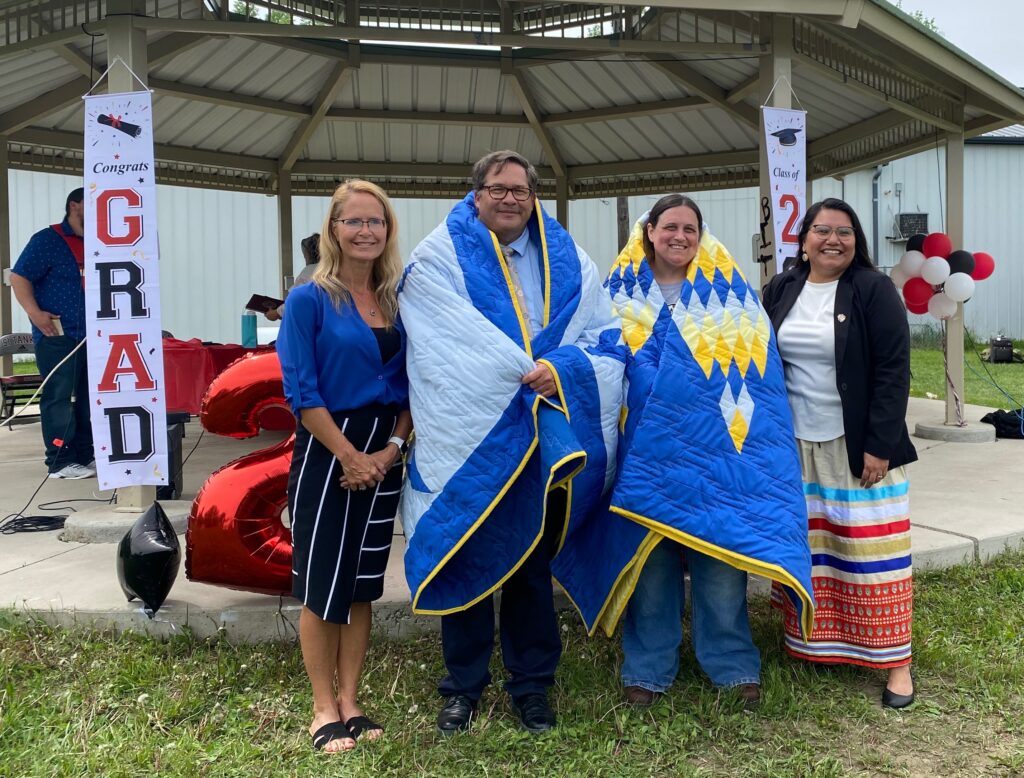South Dakota State University’s “Expanding the Circle” program is helping tribal college STEM faculty gain credentials needed to teach outside their disciplines.
By Melanie Lenart

A program to help South Dakota tribal college faculty comply with accreditation changes in 2017 has led to the awarding of four master’s degrees and two graduate certificates to participating graduate students, along with boosting credentials for another 10. Data science, geography and biology are among the disciplines covered.
South Dakota State University’s “Expanding the Circle” program began in 2018, soon after the Higher Learning Commission updated its requirements in September of 2017. Designed in part to ensure dual enrollment faculty had appropriate credentials, the new rules required higher education instructors to have at least 18 graduate credits in any subject they taught.
“And we all know that many people are asked to teach in more than one discipline,” noted Nicole Lounsbery, director of the university’s graduate school and project director of Expanding the Circle. As the new regulations loomed, most of the university’s graduate courses required in-person attendance.
A USDA Challenge grant awarded in 2018 provided the university with the means to offer more online graduate courses. The grant provided stipends to university faculty to develop online graduate courses tailored to tribal college faculty needs. The stipend required faculty members to undergo training in cultural competency and education about tribal colleges as well.
Tuition support for TCU faculty taking online graduate courses was provided by the university’s Wokini Initiative, which means “new life” and “new beginnings” in Dakota and Lakota.
Before deciding which courses to offer online, Expanding the Circle personnel assessed need by meeting with administrators and faculty from the four tribal colleges in or bordering South Dakota: Oglala Lakota College in Kyle; Sinte Gleska University in Mission; Sisseton Wahpeton College in Sisseton; and Sitting Bull College, in Fort Yates, North Dakota, near its border with South Dakota.
“Our goal was not to compete with the tribal colleges, but to help them build capacity,” Lounsbery said. “They’re vital to the communities.”
Before Expanding the Circle, only about 60 percent of interested tribal college faculty were successfully completing the online graduate courses, she said. Their input indicated they found it challenging to locate and enroll in courses, and to navigate a new learning platform.
Armed with that knowledge, university staff started working directly with interested tribal college faculty to guide them through the online experience. They also did monthly check-ins. If participating graduate students had issues with the instructors, the Expanding the Circle staff would intervene.
“It really made a difference when we advocated for them and mentored them,” Lounsbery said. With that extra effort under the Expanding the Circle project, they were able to retain 89 percent of the interested faculty, a roughly 30 percent increase in retention rate.
“We wanted everybody to stay the full course, but life happens,” she said. “So 11 percent withdrew. And I will tell you, out of those 11 percent, they had very good reasons,” usually related to family issues. In those cases, mentors assured the departing students they could return later to finish up.
The university’s Wokini Initiative supports students from the state’s tribal nations as well as faculty from its tribal colleges. Lounsbery noted that the initiative is able to cover most tuition costs for undergraduates from one of the nine federally recognized tribes in the state.
The Expanding the Circle program has led the university to launch a new master of science degree in Interdisciplinary Studies. This way, tribal college faculty who are taking 18 graduate credits in two different disciplines can put those credits together to earn a master’s degree, which requires 32 to 35 graduate credits.
While the program was developed for faculty teaching students from South Dakota’s tribal nations, faculty from other tribal colleges can also take the online courses. Lounsbery said they could even submit a Wokini application requesting tuition support. Awards will depend on whether the faculty member meets program criteria and the amount of funding available.
South Dakota State University’s graduate school is now working toward the creation of a doctoral degree in Interdisciplinary Studies, with tribal college faculty in mind.
“There’s a need for that Ph.D.,” Lounsbery said, “and I’m hoping we can do it.”
As a land grant university, SDSU owes its growth and development to the Morrill Act of 1862, which supported the establishment of the nation’s first public agricultural colleges through the sale of federal land, much of which was expropriated from Native nations. Lounsbery argued that the University has a responsibility to address this past injustice.
“We think it should be used to benefit the heirs from whom the land was taken,” Lounsbery said. “It only makes sense.”
Additional Resources
More information about the SDSU Expanding the Circle program, including a link to the application page, can be found here.
• • •
Melanie Lenart is a regular contributor to Native Science Report.
Story published December 19, 2022
• • •
Enjoyed this story? Enter your email to receive notifications.
